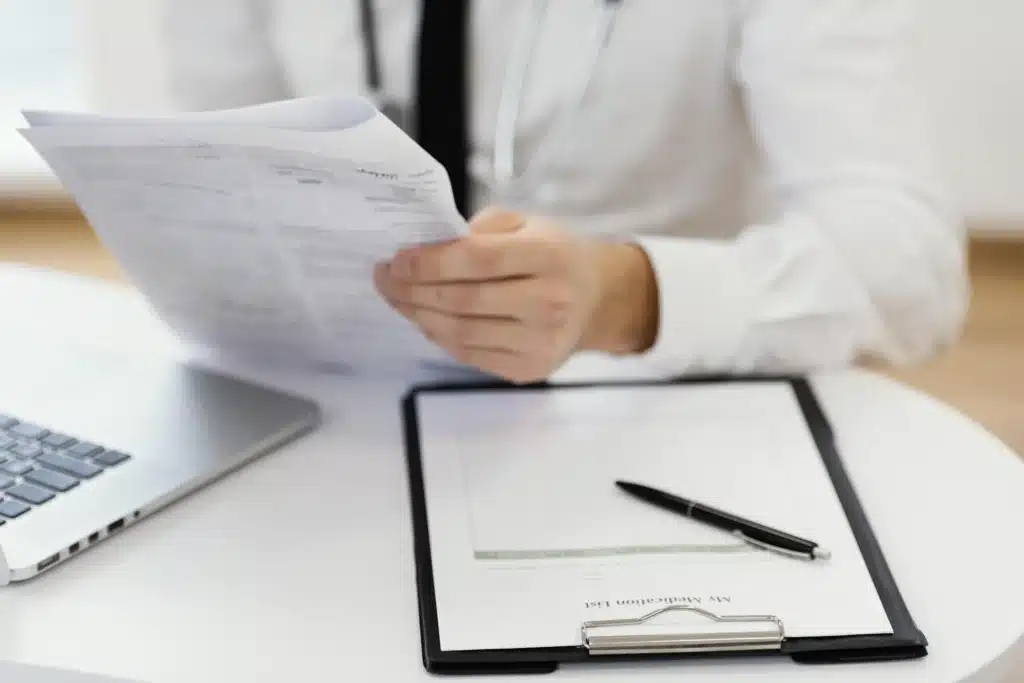
That medical bill just showed up in your mailbox, and your insurance didn't pay for everything. Now you're wondering who is responsible for medical bills not covered by insurance. You're looking at hundreds or thousands of dollars you weren't expecting to owe, and you need answers fast.
Got medical bills your insurance won't cover? Talk to our medical billing helpers today to learn about your choices and find programs that could cut down or wipe out what you owe.
This happens to millions of people every year. Insurance doesn't always cover everything, leaving patients confused about who pays what. The answer isn't always simple, but we can help you figure out your choices.
Understanding Who Pays What
When your insurance doesn't cover medical costs, you the patient pay for medical bills in most cases. This might seem unfair, but it's how healthcare works in America.
Think of it like buying a car. You might have a loan that covers most of the cost, but you're still stuck paying the down payment, monthly payments, and anything the loan doesn't cover.
Medical billing works the same way. Your insurance might be like that loan - it helps with costs but doesn't cover everything. You signed papers with the healthcare provider, making you responsible for payment.
Common Times When You Pay
Several situations leave patients holding the bill:
- Deductibles - You pay this amount before insurance starts helping
- Co-pays - Fixed amounts for doctor visits or prescriptions
- Coinsurance - Your percentage of costs after meeting the deductible
- Out-of-network care - Providers not contracted with your insurance
- Non-covered services - Treatments your plan doesn't include
Let's say you have a $2,000 deductible. If you get a $1,500 medical bill early in the year, you pay the whole thing because you haven't met your deductible yet.
Who Else Might Pay Medical Bills
While patients usually pay uncovered costs, other people sometimes have to pay depending on what happened.
Insurance Companies and What They Owe
Your insurance company must pay for covered services according to your policy terms. Sometimes they make mistakes or wrongly say no to claims.
When insurance should pay but doesn't:
| What Happened | Result | What You Do |
|---|---|---|
| Wrong Codes | Claim gets denied | Ask for fixed claim |
| Missing Approval | Insurance says no because doctor didn't get permission first | Doctor can ask for approval after the fact |
| Network Mix-up | Provider billed wrong | Check if provider is really in your network |
| Coverage Fight | Insurance says service isn't covered | Fight back with proof you needed it |
Insurance companies sometimes change their minds when you show them the right paperwork or fight their decision. Don't think their first answer is final.
Healthcare Providers and How They Bill
Doctors, hospitals, and other providers create the bills and send claims to insurance. They're responsible for:
- Using correct medical codes (including HCPCS codes for medical equipment and supplies)
- Getting required permissions before treatment
- Billing insurance before billing patients
- Giving you detailed bills when you ask
Healthcare providers often work with patients on payment plans or help programs. Many hospitals, especially non-profit ones, must offer charity care programs by law.
Employers with Group Insurance Plans
If you get insurance through work, your employer's HR department can help with coverage questions and claim fights. Some employers also offer:
- Health Savings Accounts (HSAs) - Tax-free money for medical expenses
- Health Reimbursement Arrangements (HRAs) - Employer funds for healthcare costs
- Flexible Spending Accounts (FSAs) - Pre-tax dollars for medical bills
Your benefits person knows details about what your plan covers and can help you deal with complicated situations.
What Happens When Medical Bills Don't Get Paid

Credit Score Problems
Unpaid medical bills can hurt your credit score, making it harder to:
- Get loans for cars or homes
- Rent apartments
- Get approved for credit cards
- Sometimes even get jobs
Medical debt used to show up on credit reports right away. Now, there's usually a waiting period, giving you time to fix issues.
Bill Collectors
Medical providers or collection agencies might:
- Call you over and over asking for payment
- Send letters demanding payment
- Tell credit bureaus about the debt
- Put liens on your property
- Take legal action to take money from your paycheck
Got bill collectors bugging you for medical debt you can't afford? Get help from our money advocates who know medical billing fights and can talk to providers for you.
Legal Problems
In bad cases, healthcare providers can sue patients for unpaid bills. This can lead to:
- Court decisions against you
- Taking money from your paycheck
- Taking money from bank accounts
- Putting liens on your property
However, many states now limit when healthcare providers can do these things, especially to low-income patients.
Who Is Responsible for Medical Bills Not Covered by Insurance
Being unable to pay medical bills doesn't mean you're out of choices. Several programs and tricks can help cut down or wipe out what you owe.
Help Programs
Most hospitals offer charity care or help programs. These programs can:
- Cut your bill based on income
- Set up payment plans you can afford
- Sometimes wipe out bills completely
To qualify, you typically need to show:
- Proof of income (pay stubs, tax returns)
- Bank statements
- Info about household size
- Proof of money problems
Government Programs
Several government programs help with medical costs:
Medicaid - Gives health coverage for low-income people and families. Even if you don't qualify for regular Medicaid, emergency Medicaid might cover some costs.
Medicare - Covers people 65 and older, plus some younger people with disabilities. Has specific rules about what's covered.
State Programs - Many states have other programs for medical bill help, especially for prescription drugs.

Talking Money with Providers
Healthcare providers often take less than the full amount owed, especially if you can pay a lump sum. When talking money:
- Ask for a detailed bill to check for mistakes
- Explain your money situation honestly
- Ask for a payment plan you can actually afford
- Ask if they give discounts for quick payment
- Get any deal in writing
Non-Profit Groups
Many non-profit groups help people with medical debt:
- Disease-specific charities (cancer, diabetes, etc.)
- Religious groups
- Community foundations
- National programs like RIP Medical Debt
These groups sometimes pay off medical debt or help talk to providers.
Special Cases for Medical Bill Responsibility
Certain situations change who pays medical bills, especially involving accidents, family members, or specific types of insurance coverage.
Accident-Related Medical Bills
When someone else causes your injury, they're typically liable for medical costs. However, you might still need to pay bills first and get paid back later through:
- Personal Injury Claims - Lawsuits against people who caused accidents
- Auto Insurance - Your own or the other driver's coverage
- Workers' Compensation - For workplace injuries
- Property Owner's Insurance - For slip-and-fall accidents
The legal process can take years, so you might need other ways to handle immediate medical bills.
Family Member Responsibilities
Spouses may be responsible for each other's medical debt, depending on state laws and whether they signed money agreements with providers.
Parents pay for their minor children's medical bills. Once children turn 18, they become responsible for their own healthcare costs unless parents specifically agree to pay.
Adult Children are generally not responsible for parents' medical bills unless they signed agreements making them liable.
Primary vs. Secondary Insurance Coverage
When you have multiple insurance policies, there are rules about which pays first:
- Primary Insurance - Pays first according to "coordination of benefits" rules
- Secondary Insurance - Pays remaining covered amounts after primary insurance
Even with two insurance policies, you might still owe money for deductibles, co-pays, or non-covered services.
Protecting Yourself from Surprise Medical Bills
The best way to handle medical bills is to prevent surprises before they happen. Smart planning can save you thousands of dollars.
Understanding Your Insurance Coverage
Know these key details about your health plan:
- Annual deductible amount and when it resets
- Out-of-pocket maximum - the most you'll pay in a year
- Network providers and how to check them
- Prior authorization requirements for certain services
- Coverage exclusions - what's not covered at all
Getting Cost Estimates
Before non-emergency procedures, ask for cost estimates from both the provider and your insurance company. This helps you plan and avoid surprises.
Questions to ask:
- What's the total expected cost?
- How much will my insurance cover?
- What will I owe out-of-pocket?
- Are all providers (anesthesiologist, radiologist, etc.) in my network?
Emergency Protections
The No Surprises Act gives some protection from unexpected out-of-network bills during emergencies or when out-of-network providers work at in-network facilities.
However, you still need to:
- Understand what's covered and what isn't
- Ask about network status when possible
- Keep paperwork about emergency situations
Need help understanding your insurance benefits or fighting a medical bill? Set up a meeting with our healthcare advocates who can look at your coverage and help you deal with complicated billing situations.
Taking Control of Your Medical Bills
Medical bills can feel overwhelming, but remember you have rights and choices. The key is acting quickly and knowing where to get help.
Start by looking at every bill carefully. Look for mistakes, check that services were actually done, and make sure insurance was billed correctly. Many billing mistakes get fixed simply by asking questions.
Don't ignore bills hoping they'll go away. Healthcare providers and collection agencies have to work with patients who show good faith efforts to fix their debts. Talking is better than hiding.
Look into help programs early. Many programs have limited funding or waiting lists. The sooner you apply, the better your chances of getting help.
Keep detailed records of all talks with insurance companies, healthcare providers, and collection agencies. Paperwork helps if you need to dispute charges or prove you're trying to fix the situation.
Remember that medical debt is often more negotiable than other types of debt. Providers would rather get some payment than send bills to collections where they might get nothing.
Finally, think about getting help from professionals who understand medical billing and insurance. Patient advocates, money counselors, and specialized lawyers can often get better results than trying to handle everything yourself.
Medical bills don't have to ruin your money future. With the right knowledge and resources, you can deal with this challenging situation and protect yourself from overwhelming debt.














